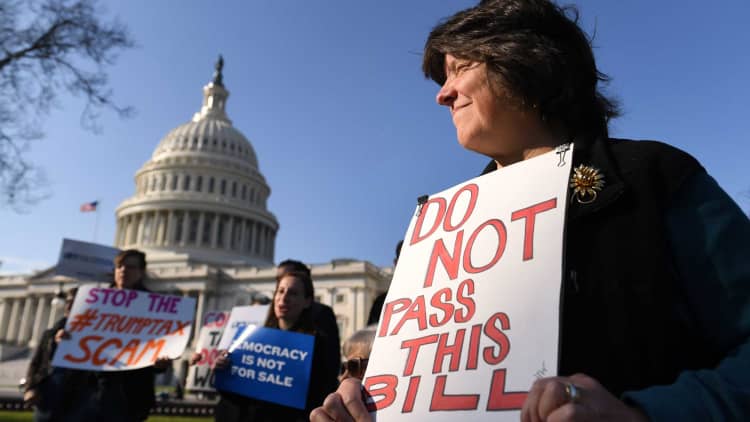The tax-reform bill and its changes to state and local tax deductions has pundits predicting a mass exodus of rich people from New York, California and other high-tax states. Yet a close look at the data suggests that while some high-earners may move, their numbers may be relatively small.
Both the House and Senate tax bills would eliminate the deductibility of state and local taxes. That would hit high earners the hardest, with many top earners in states like New York, New Jersey, California and Connecticut seeing a tax increase because they could no longer deduct their state and local taxes.
The details are still being negotiated and could change. The House bill, for instance, would allow up to $10,000 in property tax deductions, which could become part of the new law.
Yet many business groups, economists and tax pundits are predicting the changes would cause a mass millionaire migration, as the rich in high-tax states move to lower-tax states to save taxes. The wealthy, they argue, are the most mobile segment of the population and have the most to gain from moving. With state income taxes no longer deductible, the incentives to move have just gotten larger.

"Tax-Hike Fears Fuel Talk of Exodus From Manhattan and Greenwich," read a recent headline on Bloomberg, which quoted Bruce McGuire of the Connecticut Hedge Fund Association saying: "It would almost be irresponsible if [the wealthy] weren't thinking of moving."
New York Governor Andrew Cuomo predicted the changes would be "devastating" to New York.
Moody's Analytics estimates housing prices in Manhattan could fall 10 percent in the coming years under the new provision.
Goldman Sachs estimates that New York City could lose up to 4 percent of its "top earners" if the bill becomes law. "The increased tax differential between high- and low-tax areas may increase movement from the former to the latter," Goldman said in its note.
High-profile billionaires who move to Florida — including David Tepper and Thomas Peterffy — will probably continue to grab headlines to make the phenomena of wealth flight seem even greater.
Yet the most thorough research on wealth migration suggests that the numbers of rich people moving for lower taxes is relatively small. A study done by Cristobal Young and Charles Varner of Stanford University, and Ithai Lurie and Richard Prisinzano of the U.S. Department of Treasury analyzed 13 years of income data for all Americans earnings $1 million or more — totaling about 3.7 million tax filers over the time period.
Broadly speaking, the study found that only 2.4 percent of million-dollar earners move every year. That rate is lower than the 2.9 percent move rate for the broader population. And by looking at the tax differentials between states, it found that only a small slice of the millionaires who move are driven by taxes. The study found that slightly more than 2 percent of millionaire migrants "appear to have income-tax motivations" when they pick up stakes. In other words, only 0.04 percent of millionaire earners move for tax reasons.
Why isn't the number higher? Rather than being a transient rich, today's wealthy are more like an "embedded elite," with deep economic and social ties to their communities, according to the study.
"In general, high-income earners are more likely to be married, to be in a dual-career household, to have school-age children, to own rather than rent their home, and to own a business — all factors that discourage migration," the report said.
Most importantly, the big jobs that pay those high salaries are at companies that aren't easily moved. Goldman Sachs isn't likely to pick up and move to Miami because its investment bankers want to lower their tax bill.
Business owners are also anchored to their locations, the study says.

"If you're a McDonald's franchise owner and you have several McDonald's stores in New Jersey, you can't just pick up and move to Florida," said Howard Gleckman of the Tax Policy Center.
Of course, lots of rich people are moving from the Northeast to Florida. But retirement, weather and lifestyle may be as or more important than taxes in luring people to the Sunshine State. In fact, removing Florida from the migration analyses found that "outside of Florida, differences in tax rates between states have no effect on elite migration. Other low-tax states, such as Texas, Tennessee, and New Hampshire, do not draw away millionaires from high-tax states."
Granted, the elimination of state and local taxes would impose a new virtual tax on the rich in blue states. So that could change the dynamics. The study found that "a 10 percent increase in the top tax rate leads to a 1 percent loss of millionaire population."
The elimination of state and local tax deductions in New York and California could mean an effective tax increase of up to 5 percent for some top earners — so based on the study's calculus, up to a half of one percent of millionaire-earners could move because of the changes. That's a lot less than the 4 percent predicted by Goldman.
Young said that while his study found that past claims about wealth migration tended to be exaggerated, the specific impacts of the upcoming tax reform remain unclear.
"At the margins, I'm sure people will move," Young said. "But when the dust settles, I think it could be a half of one percent at most." But he added, "It will be interesting to study."
WATCH: GOP tax bill heads to conference



